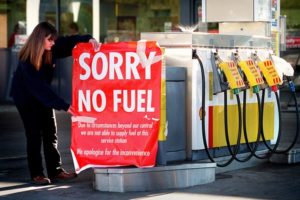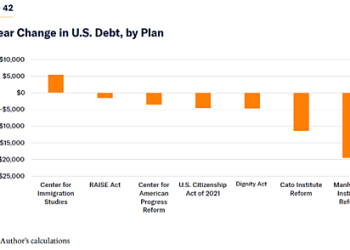The government is to suspend competition law to allow oil firms to target fuel deliveries at petrol stations following recent panic buying.
Officials said the move would make it easier for companies to share information and prioritise parts of the country most at need.
It follows days of long queues at the pumps, after fears of disruption to the fuel supply sparked panic buying.
But a minister said there were no plans to bring in the Army to drive tankers.
The government has been considering using the Army, but Environment Secretary George Eustice said the shortage of drivers was “not a huge problem”.
“The only reason we don’t have petrol on forecourts is people are buying petrol when they don’t need it,” he said, predicting that things would “calm down” once anxious people had filled their cars.
The Petrol Retailers Association has warned that as many as two-thirds of its membership of nearly 5,500 independent outlets are out of fuel, with the rest of them “partly dry and running out soon”.
Announcing the measure to exempt the oil industry from the Competition Act 1998, Business Secretary Kwasi Kwarteng said the government had “long-standing” contingency plans to maintain fuel supplies.
He said allowing the industry to share information would mean companies could work together more effectively to minimise disruption.
The government also relaxed competition law in March 2020, to help supermarkets work together to maintain food supplies.
A shortage of lorry drivers has caused problems for a range of industries in recent months, from supermarkets to fast food chains.
In recent days, some fuel deliveries were affected, leading to panic buying and lengthy queues at some petrol stations.
In a joint statement from companies including Shell, ExxonMobil and Greenergy, the industry reiterated that pressures on supply were being caused by “temporary spikes in customer demand – not a national shortage of fuel”.
PRA chairman Brian Madderson told the BBC the shortages were down to “panic buying, pure and simple”, with oil companies prioritising keeping motorway service station pumps topped up.
Pumps were mainly running dry in Britain’s urban areas, while Northern Ireland was currently unaffected, he said.
Mr Madderson added that on Monday that filling stations were being restocked, but there were not enough deliveries to restore their normal levels of fuel.
“One of our members yesterday received a tanker at midday and by late afternoon the entire tanker had disappeared into people’s cars,” he said.
On Saturday, the government announced it would offer temporary visas, lasting until Christmas Eve, to 5,000 foreign fuel tanker and food lorry drivers and 5,500 poultry workers in a bid to limit disruption in the build up to Christmas.
Other measures include sending nearly one million letters to drivers who hold an HGV licence – to encourage them back into the industry – and plans to train 4,000 people to become HGV drivers.
Elizabeth de Jong, director of policy for Logistics UK, told Today that it would be “days, possibly a couple of weeks” before the visa applications were open.
She said the industry had wanted more visas to be available and for a longer time, but she said the key issue now was to make them attractive to drivers, which was likely to mean offering good wages.
The UK had lost 72,000 drivers between the second quarter of 2019 and the same period in 2021, Ms de Jong said – partly due to people returning to the EU after Brexit.
At the same time, she said the pandemic had disrupted testing for HGV licences, making it harder to replace the lost drivers.
The DVLA said there were more than 54,000 applications for licences awaiting processing, although some of those may be renewals and drivers can continue to work while they are dealt with.
The shortage of drivers and other workers is also causing concern in the food and retail industry.
The British Retail Consortium said the number of visas being offered was “too small” to make an impact on the disruption expected at Christmas.
Read more:
UK suspends competition law to get petrol to forecourts
















